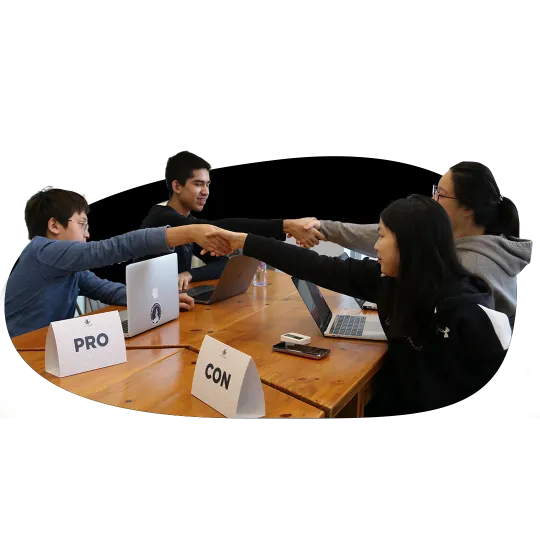The History of Debate: From Ancient Greece to Remote Learning

Debate is the art of persuasion. It's a way to use our words to convince others that they should take our side. It's been around for thousands of years, and it continues to play an important role in the classroom and the political landscape today.
As a form of rhetoric, debate is a means of communicating ideas and beliefs, engaging in healthy discourse, and improving skills like collaboration and critical thinking. It can be used to solve disputes or simply get people talking.
More than that, debate can be used in decision-making. When two people disagree about something, whether it's how to share a snack or how to make the world a better place, they may turn to debate to understand whose point of view is more reasonable and which action to take.
The Beginnings of Debate
Debate is an ancient form of argumentation. It was first used as a way to resolve quarrels, but it soon became apparent that it could also be used as a tool to teach people how to think critically and argue effectively.
It originated in Greece, around 500 B.C. There, Socrates used it in his philosophy classes at the Academy in Athens—so it's safe to say there's a strong precedent for the merits of debate.
The Roman orators Cicero and Quintilian were masters of debate. They taught their students how to argue both sides of an issue so well that their opponents didn't even know they were being argued into a corner until it was too late!
Medieval scholars also used debate as a method of discussing important ideas with each other in order to come up with new ways of thinking, from science to religion.
Who Usually Engages in Debate?
Debate was once a privilege reserved for the elite. It was not accessible to everyone and only allowed for certain groups of people.
In ancient Greece, there were no schools or colleges for people to study philosophy or rhetoric, the two main components of debate that we know today. Instead, these topics were taught by philosophers who traveled around teaching young men and women how to think critically about politics and society at large.
Fortunately, nowadays, debate is an activity that is enjoyed, practiced, and used by all kinds of students around the globe. These students come from a vast variety of cultures and backgrounds, but all have the same goal to communicate effectively.
Take LearningLeaders as an example. Students across the world log in to the same debate classes, exchanging speeches, viewpoints, and learnings. We've come far from ancient Greece—debate is now an activity anyone can take part in, and LearningLeaders provides the setting and the expert teachers.
What Is the Purpose of Debate?
At its core, the purpose of debate is for both sides of a disagreement to understand each other better. A good debate should help everyone learn more about the topic at hand and allow them to make better decisions. Yes, it can be fun to win—but more than a game, debate is a way to understand different perspectives.
Modern debate may have rules and regulations, but in the end, debate is simply a means for communication, argumentation, and discussion. It allows people to learn new things, become better thinkers, and stay aware of the world around them.
Finally, debate is a healthy way to resolve conflicts. It requires you to consider your beliefs and whether you have good reasons for having them. It helps you become aware of logical fallacies. It also helps you become more open-minded!
The Spread of Debate Around the Globe
During the Renaissance, debate became more popular in Europe and America. This was a time of change for many people and represented the beginning of new ideas and new ways of thinking. People began to question what they had long believed was true and began to explore different possibilities.
What this means is that the Renaissance led to some really interesting debates!
Nowadays, debate is a common sight in academic institutions and democratic countries. You might have heard of one particular debate that took place in 1789: Thomas Jefferson was arguing in favor of the new Constitution, and Alexander Hamilton was arguing against it. The debate took place in New York City Hall and lasted three days, with an audience of Congress members and George Washington himself!
How Has Debate Changed?
Debate has changed over time in many ways. Once a rhetorical and philosophical endeavor, it now tends to be strictly informative and persuasive. Different debaters disagree on whether the goal of a debate is to push for one side's victory or to reach the truth of the matter. Culture, audience perception, location, and debate format all affect the way a debate looks and how it takes place.
What remains the same, though, is the nature of debate as a way to understand each other. Whether it's World Schools debate, BP debate, or a chat with your friends, debate teaches us to make good arguments and to listen and engage with people who have different viewpoints than our own.
If you're interested in learning more about debate or getting involved with competitions, check out the programs LearningLeaders has to offer!
